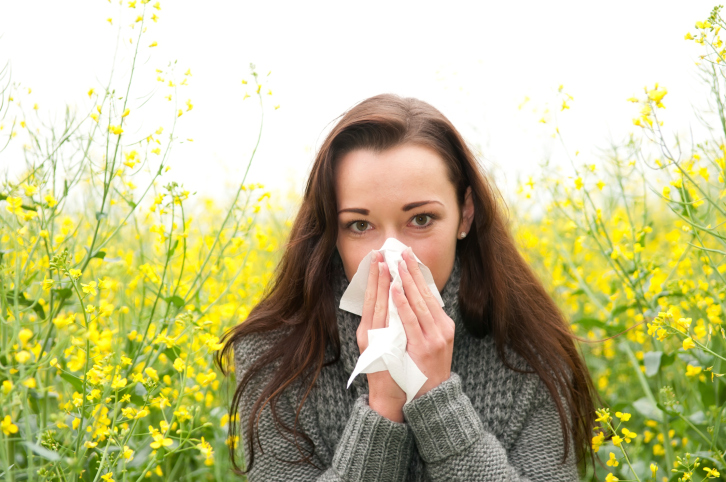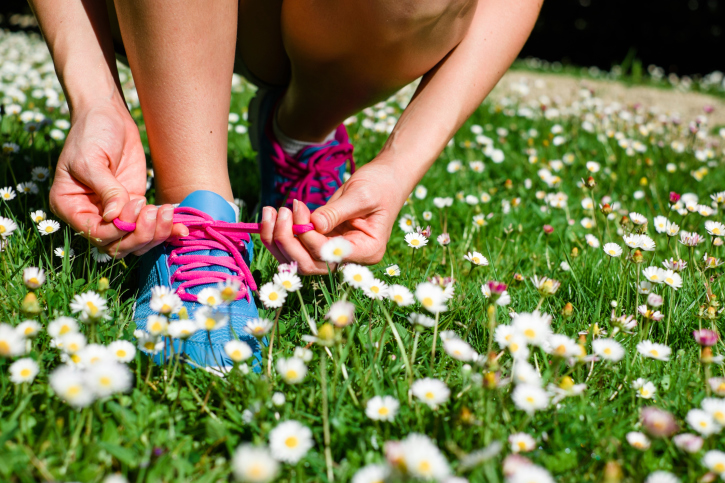Should you run with seasonal allergies?
Check out our best advice so you can enjoy spring running without the sniffles

In many parts of the country, spring weather is just starting to replace the cold winter temperatures, and in other areas, it’s right around the corner. The warmer weather is always a welcome relief to runners who’ve been slogging through snow and freezing temperatures for the last several months, but for some, it brings another unwelcome challenge: seasonal allergies. Spring can be one of the best times of year for running, but having a stuffy nose and itchy eyes can really affect your ability to enjoy it. Check out these tips for running with seasonal allergies so you can get the most out of the warm-weather months.

RELATED: Should you run with a cold?
Is it safe to run with seasonal allergies?
Having allergies is very similar to having a cold — you feel tired, you have trouble focusing and your breathing is impaired. Most experts would advise against running when you’re sick, so should you run when you have allergies? The answer to that depends on what types of symptoms you’re experiencing, and how bad they are. For many people, physical activity can cause their allergies to flare up. This is because you’re breathing more heavily, and when you breathe in heavily, the air is cooled (even in warm weather), which causes your sinuses and lungs to constrict.
Seasonal allergies can increase your risk of exercise-induced asthma, even if you don’t typically have breathing issues while running. Asthma attacks can be dangerous, so if your allergies are inducing asthma, you may be better off staying inside. Additionally, if you are experiencing a fever or have symptoms below the neck, do what you would if you were sick: take a day off.
This doesn’t mean that you can’t run outside if you have seasonal allergies, but you may need to take a few things into consideration and take a few extra precautions that your non-allergy-suffering running buddies don’t. Use these tips to help ease your symptoms so you can enjoy spring running with the rest of the world.

Know your pollen counts
Best practice for runners with allergies is to run when pollen counts are at their lowest. Tree and grass pollens tend to be higher in the evening hours, while ragweed, which can be more prevalent in late summer and early fall, tends to be higher in the morning, so runners should avoid running at these times. It’s a good idea to check the pollen counts regularly on whatever weather service you use as well.
Additionally, runners with allergies should find out what their personal pollen count is. Some people begin experiencing symptoms when pollen counts are as low as 20 grains per cubic metre, while others can tolerate much higher amounts. Pay attention to pollen counts and keep track of when you start experiencing symptoms. Once you have a rough idea of where your tolerance lies, you can avoid running at times when the pollen count exceeds that level.
Check the weather
Dry, windy days are typically when pollen counts are highest, so avoid running on those days if you can. Running after a light spring rain can also be a good idea, since rain can help wash pollen away, but avoid running after prolonged rain or a heavy downpour, because rain can also cause pollen spores to rupture, which breaks them into smaller pieces and makes them easier to get into your lungs. Rain can also increase the amount of mold spores in the air, so depending on what type of allergy you have, rain can help or make it worse.
Wear the right gear
If dry, itchy eyes are a problem, try getting a pair of wrap-around sunglasses, and if breathing is more of an issue, try covering your nose and mouth with a face mask or bandana. Ideally, choose a cotton mask with no more than two layers for easy breathing.
Clean up right away
When you get in from your run, be sure to toss your clothes in the laundry right away and shower as soon as possible. The worst allergy symptoms tend to occur after you come into contact with pollen, so cleaning up quickly when you get inside can help you side-step the worst of your symptoms. If you’re out and can’t get home right away, bring an extra set of clothes that you can change into so you’re not continuing to breathe in the pollen sitting on your running clothes.

Take your meds
Over-the-counter allergy medications can help a lot if you take them regularly, so talk to your doctor to decide what type of medication regime will work best for you, your specific allergies and your running schedule. Just beware: if you’re a competitive athlete, some common drugs, such as Sudafed, contain an ingredient called pseudoephedrine, which is a banned substance in competitions. Before taking any medication, always check the World Anti-Doping Agency’s banned drug list. Additionally, if you suffer from allergic asthma, make sure to take your inhaler about 15 minutes before running, and to start your run slowly.
Talk to an allergist
If over-the-counter allergy meds aren’t helping, talk to an allergy specialist who can pinpoint exactly what your allergy is. From there, you can have a small amount of the allergen injected into your bloodstream until you build up immunity.
Spring is one of the most enjoyable times of year for running, so don’t let allergies keep you from making the most of it. Follow these tips and talk to your doctor if you struggle with seasonal allergies, so you can hit the streets and trails with the rest of us.

